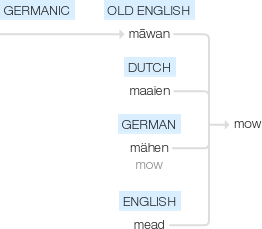Mow
Old English māwan, of Germanic origin; related to Dutch maaien, German mähen ‘mow’, also to mead2.
wiktionary
From Middle English mowen (participle mowen), from Old English māwan (past tense mēow, past participle māwen), from Proto-Germanic *mēaną (compare Dutch maaien, German mähen, Danish meje, Swedish meja), from Proto-Indo-European *h₂meh₁-(“to mow, reap”); compare Hittite[script needed](ḫamešḫa, “spring/early summer”, literally “mowing time”), Latin metō(“I harvest, mow”), Ancient Greek ἀμάω(amáō, “I mow”).
Middle English mowe, from Middle French moue(“lip, pout”), from Old French moe(“grimace”), from Frankish *mauwa(“pout, protruding lip”), from Proto-Germanic *mawwō(“muff, sleeve”). Akin to Middle Dutch mouwe(“protruding lip”). Cognate to moue(“pout”).
Old English mūga. Cognate with Norwegian muge(“heap, crowd, flock”).
mow (plural mows)
etymonline
mow (v.)
Old English mawan "to cut (grass, etc.) with a scythe or other sharp instrument" (class VII strong verb; past tense meow, past participle mawen), from Proto-Germanic *mæanan (source also of Middle Low German maeyen, Dutch maaien, Old High German maen, German mähen "to mow," Old English mæd "meadow"), from PIE root *me- (4) "to cut down grass or grain." Related: Mowed; mown; mowing.
mow (n.)
"stack of hay," Old English muga, muwa "a heap (of grain, pease, etc.), swath of corn; crowd of people," earlier muha, from Proto-Germanic *mugon (source also of Old Norse mugr "a heap," mostr "crowd"), of uncertain origin. Meaning "place in a barn where hay or sheaves of grain are stored" is by 1755.
